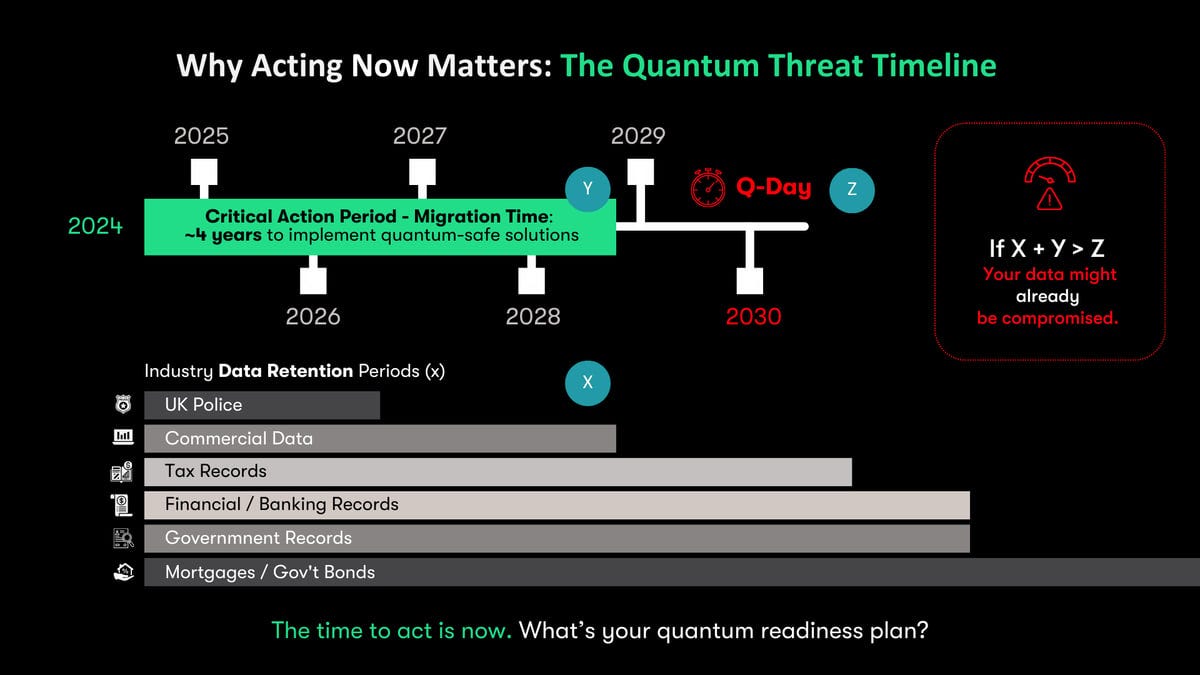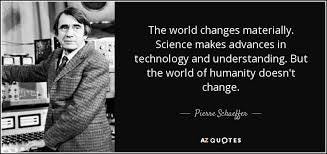Quantum: start now or wait?
An unqualified opinion by your favorite, highly biased quantum enthusiast
A recurring topic, which I want to write about yet again, hopefully with a different, more intuitive perspective. For past thoughts on it see my article from January.
To me it’s simple. The fire, the wheel, electricity, the internet - every now and then someone comes up with something super cool that completely changes our lives. Not something better, faster or cheaper that improves our lives (aka AI). But something entirely new that allows us to do stuff we previously thought impossible - or didn’t think about at all.
With that, very often, the course of history changes too. Ruling empires perish while others rise. New industries create unheard of wealth while others disappear in the abyss. The first billionaire, the first astronaut, the first superhuman.
Quantum Tech COULD be such an invention.
Should everyone do quantum? No! But if you care about national security, outsized ROI or leading your industry… well, then don’t miss the start because this is a game of no second chances.
Is quantum a game changer? A paradigm shift?
Let’s ignore the pesty question of when quantum technology will actually reach maturity. Only bean counters, Bitcoin bro’s and bored journalists care if it’s 3, 5 or 10 years.
I am talking about something much more fundamental.
A "paradigm shift" implies a fundamental transformation in how society operates or perceives the world, akin to the internet or electricity. Quantum technology’s potential for such a shift is significant.
Revolutionizing Computation: Quantum computing could solve intractable problems, such as simulating quantum systems for new materials or optimizing smart grids, driving breakthroughs in energy, healthcare, and sustainability. The World Economic Forum’s 2024 Technology Report notes its potential to tackle "wicked problems" like climate change.
Transforming Communication: A global quantum internet could redefine data security, reshaping industries like finance and governance. A "quantum-secured world" might establish new norms for privacy and trust.
Advancing Scientific Discovery: Quantum sensors could unlock insights into quantum gravity or dark matter, potentially spawning unforeseen technologies. Real-time brain monitoring could revolutionize neuroscience and mental health.
Complex Optimization: Financial markets involve computationally intense tasks (e.g., portfolio optimization, risk modeling). Quantum algorithms (like the quantum approximate optimization algorithm, QAOA) could yield better solutions more swiftly, especially as hardware matures.
Governance and Global Impact: Enhanced modeling tools can help policymakers simulate and stress-test economic scenarios, offering more robust frameworks to tackle climate change, poverty reduction, and large-scale infrastructure projects.
Critical Infrastructure: Quantum technology applied to secure communication lines (e.g., quantum satellites, fiber networks) is a matter of national strategic importance. Nations at the forefront of quantum communication could gain a significant security edge.
Quantum technology is a game changer in secure communication, precision sensing, and computing and material science. Its potential to be a paradigm shift for humanity is profound but depends on overcoming significant challenges. New industries and jobs could emerge, with quantum computing projected to generate $1.3 trillion in value by 2035 (McKinsey, 2024).
Add to that a profound change in our defense and attack posture when it comes to national security - and anyone who cares about it.
Yes, I am ignoring the risks and caveats, for now, and, yes, we haven’t even started to discuss time travel.
Start now or wait
Let’s explore various scenarios.
The quantum threat
This one is easy. No debate needed.
Given the long lead times for upgrading cryptographic systems and the rapid pace of quantum research, the right time to start preparing for the quantum threat is effectively now. This includes exploring and gradually implementing post-quantum cryptography (PQC), educating organizational leadership, and planning for eventual large-scale migration—even if large, fault-tolerant quantum computers capable of breaking today’s encryption may be a decade (or more) away.
We even have our own law for it - Mosca’s Theorem
I cannot think of any risk by starting now, no downside in being early and many obvious benefits.
Cost-Saving in the Long Run
Proactive migration lowers the likelihood of emergency overhauls down the line, which tend to be more costly, disruptive, and prone to errors.
Risk Mitigation
Strengthening cryptography can preemptively safeguard state secrets, intellectual property, and personal data. This underpins trust in financial systems and critical infrastructure.
Competitive Advantage
Early adopters can position themselves as secure and forward-thinking—potentially attracting investors, clients, or citizens who prioritize data integrity and privacy.
Global Collaboration
A coordinated effort to share best practices (e.g., through international forums, public–private partnerships) can minimize fragmentation in new security standards, fostering global interoperability and resilience.
It is impossible to say exactly when a quantum computer will be able to break encryption but, rather than going with a consensus estimate, I believe it is crucial to adopt a stance of “possible worst case” and start from there.
And that possible worst case is much closer than you think.
First mover advantage
The first-mover advantage in adopting quantum technology can be significant, offering organizations the chance to lead their industry, secure intellectual property, and gain a competitive edge. Being a first mover in quantum technology comes with notable benefits:
Intellectual Property (IP) and Patents: Early adopters can secure patents on quantum innovations — such as algorithms, hardware, or applications — creating barriers for competitors and potential revenue streams through licensing.
Industry Leadership: First movers can shape industry standards, influence regulations, and establish themselves as thought leaders, positioning them for long-term dominance.
Market Capture: In industries where quantum tech offers a transformative edge — like pharmaceuticals (e.g., drug discovery) or finance (e.g., optimization) — early adopters can capture market share and build customer loyalty before others enter.
Talent Attraction: Leading the quantum race can draw top talent, a scarce resource in this field, fueling further innovation.
In highly competitive fields, waiting too long could let first movers establish dominant positions, especially if quantum tech becomes a core differentiator.
A steep learning curve
You can’t easily buy your way into quantum tech.
Talent Shortage and Long Lead Times
Scarce Expertise: Quantum computing merges advanced physics, computer science, and engineering. This interdisciplinary skill set is in short supply globally. Recruiting, training, and retaining specialists takes significant time.
Knowledge Onboarding: Even if you begin with a small team or designated “quantum champions,” getting them up to speed on quantum algorithms, hardware architecture, and software ecosystems is a months-to-years process.
Strategic Positioning and Competitive Advantage
First-Mover Benefits: Early adopters develop internal experience and tools (e.g., coding frameworks, cryptography protocols), potentially securing a competitive edge in high-value use cases such as complex optimization or secure communications.
External Partnerships: Collaborating with universities, quantum start-ups, or consortia can give you early exposure to cutting-edge research. Building these relationships also helps you share both the cost and the risk of exploratory quantum projects.
Gradual Learning Curve and Flexible Timelines
Iterative Approach: Meaningful quantum use cases will evolve over time. Tackling them requires iterative experimentation, workforce capacity-building, and technology roadmapping.
Opportunity to Pilot: “Starting early” often means running small pilot programs or proofs of concept (PoCs). This approach refines internal understanding of quantum technology without demanding a fully dedicated quantum R&D division on day one.
Ultimately, the earlier you incorporate quantum readiness into your strategy, the smoother (and potentially more cost-effective) your transition will be once scalable quantum technology matures. By starting now with limited yet focused initiatives, your organization can cultivate in-house expertise, form strategic alliances, and position itself to capitalize on quantum’s transformative potential — rather than scrambling to catch up later.
Commercial use cases or bust
Discrete “use cases” for quantum are only one aspect of the quantum adoption story. While showcasing realistic applications is crucial for proving value to decision-makers, these use cases alone do not solve the larger challenges (aka opportunity) of:
Building a Quantum-Capable Workforce
Without properly trained quantum experts, data scientists, and software developers, even the most promising use case can stagnate.
The talent shortage and steep learning curve mean it’s not just about identifying what to do with quantum, but also ensuring the right people and processes are in place.
Overcoming Technological Hurdles
Quantum hardware is still maturing; near-term quantum devices (often labeled NISQ—Noisy Intermediate-Scale Quantum) have significant limitations in terms of coherence times, error rates, and scalability.
This reality tempers the excitement surrounding any specific quantum application, reminding us that robust, fault-tolerant devices remain a multi-year journey.
Aligning with Organizational Strategy
For quantum tech to move beyond pilots or proofs of concept, it must slot into an organization’s broader strategic priorities—whether that be accelerating R&D, increasing cybersecurity, or improving efficiency.
Simply announcing a “quantum use case” without ensuring it aligns with the company’s resources, risk tolerance, and timeline often leads to stalled initiatives.
You can read more about my thoughts on use cases in last week’s article.
Emphasis on “use cases as just one part of the equation” aligns closely with our broader discussions on quantum readiness. Identifying compelling quantum applications is essential for guiding R&D, securing executive support, and achieving early milestones. However, success depends equally on fostering the right talent, managing technology uncertainty, and embedding quantum into a well-planned organizational and economic strategy.
While showcasing quantum’s utility via real use cases is a powerful motivator, the journey to full-scale adoption relies on ecosystem-level maturity, thoughtful partnerships, and ongoing investment in people and processes—a message that is consistent with the modern consensus among quantum experts and strategic analysts alike.
Emergence of new competition
We’ve seen it in digital, in AI and in Blockchain - new technologies foster new, credible competitors. Quantum tech will be no exception.
Enhanced Computational Power
Certain problems could see exponential or high-order speedups from quantum algorithms once fault-tolerant quantum computers are available.
A new entrant with domain expertise and quantum know-how might leapfrog incumbents that rely on purely classical methods for R&D, trading strategies, or complex logistics solutions.
Specialized Solutions and Niches
Quantum-inspired algorithms (running on classical hardware) and early-stage quantum cloud services allow smaller players to experiment without enormous capital investment.
Industries with high-value use cases could see agile start-ups finding breakthroughs faster if incumbents fail to keep pace.
Quantum Security and Cryptography
Widespread concerns over the “quantum threat” to current encryption might push certain industries to adopt post-quantum cryptography (PQC) and quantum-secure solutions more aggressively.
New cybersecurity or secure-communications firms with robust quantum-safe offerings could compete with or eclipse older vendors that move slowly to update their cryptographic stacks.
Discount these possibilities and watch yourself getting disrupted.
Potential for Disruption Across Key Sectors
The naysayers are shouting “but we don’t have use cases/algorithms for that” or “classical can do this well enough”. I am shouting “stop turning quantum into a hybrid tool for heuristic advantage”:
Finance and Banking
Quantum-Enhanced Risk Modeling: Firms with quantum-optimized models for portfolio management, risk assessment, or derivative pricing could gain a significant edge in trading or risk mitigation.
Pharmaceuticals and Healthcare
Accelerated Drug Discovery: Quantum simulations of complex molecules promise breakthroughs in drug design and targeted therapies.
Materials and Chemicals
Novel Materials & Catalysts: Quantum computers can simulate atomic interactions with higher fidelity than classical methods.
Cybersecurity
Quantum-Safe Solutions: Companies offering post-quantum cryptography, quantum key distribution (QKD), or next-gen cyber solutions could capture markets quickly if major data breaches occur.
While quantum technology indeed could enable disruptive new competitors, a full “overnight leapfrogging” is unlikely. Instead, expect a gradual escalation of quantum’s influence, with early movers (incumbents and start-ups alike) forming partnerships and jockeying for leadership positions. If established businesses are complacent or slow to adapt, they do risk losing ground to more agile newcomers or even established rivals that develop quantum capabilities faster. The biggest factor isn’t merely being a new market entrant, but rather:
Having the right domain-specific quantum use case,
Possessing or cultivating top-tier quantum talent, and
Being prepared to invest steadily over a multi-year horizon.
In that sense, established businesses can preempt disruption by proactively investing in quantum readiness. Conversely, resourceful and specialized new entrants may find precisely those niches where quantum technology can deliver quantifiable advantage — paving the way for genuine market shake-ups.
Again, I am ignoring all the well known risks and challenges here. I am taking a “hype” position on purpose.
What does this mean for you, the quantum curious?
The Quantum Ecosystem.
For an ecosystem such as a region, emerging country, or similar entity, the decision to engage with quantum technology now or later requires a strategic, forward-looking approach that balances immediate constraints with long-term opportunities. Given the transformative potential of quantum technology and the global race to harness its power, starting now is advisable — but with a focus on building foundational capabilities, fostering collaboration, and prioritizing areas of maximum impact.
Why Start Now?
Leapfrogging Traditional Development Stages
Emerging regions have a unique opportunity to bypass legacy systems and adopt advanced technologies like quantum computing early. This "leapfrogging" can accelerate development in critical areas such as healthcare, agriculture, or energy, where quantum solutions could address pressing local challenges more effectively than traditional methods.Global Competitiveness
Quantum technology is becoming a key driver of innovation worldwide, with countries like the U.S., China, and the EU investing heavily. Engaging now ensures that emerging regions remain competitive, avoiding a future where they are left behind or dependent on foreign technologies. Early action also positions regions as attractive partners for collaboration and investment.Time to Build Capacity
Quantum technology requires a skilled workforce, robust research infrastructure, and institutional knowledge — none of which can be developed overnight. Starting early allows regions to gradually build these capabilities, preparing them to capitalize on quantum advancements as they mature.
Delaying engagement with quantum technology carries significant risks:
Missed Opportunities: Waiting could lock regions into outdated systems, making it harder to adopt quantum solutions later.
Brain Drain: Without local opportunities in advanced fields, talented individuals may migrate to regions already investing in quantum tech.
Economic Dependence: Late adopters risk becoming reliant on foreign quantum technologies, missing out on economic growth and innovation.
For an emerging region or country, the time to engage with quantum technology is now but with a focus on building foundations, fostering collaboration, and targeting high-impact areas. By investing in education, identifying key use cases, and creating a supportive ecosystem, these regions can position themselves to harness quantum technology’s potential for economic growth, societal benefits, and global competitiveness. The challenges are real, but the rewards of early, strategic action outweigh the risks of inaction.
The Quantum Investor.
It’s nice to have a ton of money. But where to find returns?
Quantum Tech is Early but Promising
Quantum technology is still in its infancy, with challenges like qubit stability and scalability yet to be fully resolved. However, its potential to revolutionize industries is enormous.
As a large investor, you have the capital and patience to weather this uncertainty and position yourself for significant long-term gains while valuations remain relatively low. If you don’t, then quantum ain’t for you.
First-Mover Advantage
Secure intellectual property (IP): Patents in quantum hardware, software, or applications can provide a competitive edge and future revenue streams.
Shape industry standards: Early involvement lets you influence how the technology evolves.
Attract talent: With quantum experts in short supply, early movers can build relationships with top minds.
Timing is Critical
Quantum tech is entering a growth phase, fueled by increasing investment from governments (e.g., U.S., China, EU quantum initiatives) and private sectors. Starting now lets you enter at lower valuations with higher upside potential.
Delaying could mean higher entry costs and lost ground to competitors as the field matures over the next 10-20 years — a timeline well-suited to large investors with a long-term horizon.
Waiting might seem safer, but it carries hidden costs:
Higher Entry Prices: As quantum tech progresses, valuations will rise, reducing your return potential.
Missed Opportunities: Competitors who act now could lock up IP, talent, and partnerships, leaving you at a disadvantage.
Learning Curve: Starting later means playing catch-up in a field with a steep knowledge barrier.
For a large investor, the time to enter quantum tech is now. By starting with a diversified portfolio (hardware, software, communication, cryptography), strategic partnerships (academia, startups, industry), and a long-term mindset, you can mitigate risks while positioning yourself at the forefront of this transformative field. Begin today to secure your stake in the quantum future — waiting only increases the cost and reduces the reward.
The Quantum User.
If you’re a large corporate user, such as a multinational company or a major enterprise, deciding how to approach quantum technology requires a strategic, forward-looking perspective. Quantum technology is still emerging, but its potential to transform industries like finance, pharmaceuticals, logistics, and cybersecurity is immense. The key is to balance the risks of early adoption — such as high costs and technical uncertainty — with the opportunities to gain a competitive edge and drive innovation.
You should begin engaging with quantum technology now, but with an emphasis on exploration, partnerships, and building internal capabilities rather than full-scale implementation:
Quantum Technology is Maturing, But Not Fully Ready:
Quantum computing, communication, and sensing are still in their early stages, with scalable, practical applications likely 5-10 years away for most industries. However, starting now allows you to explore its potential and prepare for future adoption.First-Mover Advantage vs. Fast Follower:
Being a first mover could offer intellectual property (IP) and market leadership. As well as preferred access and partnerships. It also hedges you against unforeseen progress in quantum tech, which is a possible scenario.Competitive Landscape:
Major players like Johnson & Johnson, Boeing, Wells Fargo and JPMorgan Chase are already investing in quantum research and pilot projects. Waiting too long could leave you behind competitors who are building expertise and securing early advantages.
Why Start Now?
Avoid Falling Behind: Competitors are already exploring quantum tech. Delaying could mean missing out on key partnerships, talent, or IP.
Prepare for Disruption: Quantum will disrupt industries unevenly. Early engagement ensures you’re ready when it transforms your sector.
Leverage Momentum: Global quantum initiatives and corporate investments are accelerating progress. Starting now lets you tap into this growing ecosystem.
Why Not Wait?
Missed Learning Opportunities: Quantum tech has a steep learning curve. Waiting delays your ability to build expertise and identify high-impact use cases.
Higher Costs Later: As the field matures, the cost of entry (e.g., talent, partnerships) will rise, and early adopters may lock in key advantages.
Risk of Disruption: If a competitor implements quantum solutions successfully, they could gain a significant edge, especially in data-intensive or optimization-heavy fields.
For a large corporate user, the time to engage with quantum technology is now—but with a focus on exploration, pilot projects, and partnerships. By starting small, you can build knowledge, identify high-value applications, and position your organization to scale quickly when the technology matures. This approach minimizes risk while ensuring you’re prepared to leverage quantum’s transformative potential. Don’t wait for the quantum revolution — begin shaping it today.
Oh and btw, my company, GQI, would love to help you with it - no matter if you are an ecosystem, an investor or a user. We have a stellar team of experts ready to guide you.
Winner take all
Let’s address the question of whether quantum technology adoption by demographics such as ecosystems, investors, or end-users will result in a "winner take all" scenario. In this context, "winner take all" suggests that early adopters could gain such a significant advantage that latecomers are effectively shut out of the market or left at a severe disadvantage.
In the near-to-mid term, early adopters (whether nations, investors, or enterprises) can gain a head start, secure specialized talent, shape standards, and capture pockets of value.
In the long-term, this is more uncertain. While we are likely, just as in other technologies, to see a couple of regional quantum “superpowers” emerge, they will not, in consequence, dominate all of quantum tech.
However, context is important.
On the ecosystem side, if a region or country is able to build aggressive or defensive quantum computing capabilities before a perceived potential enemy it might lead to a lock out when it comes to data sovereignty, critical infrastructure and personal privacy.
On the investor side, luck aside, risk will deliver returns, especially within a portfolio. It is unlikely that significant “late bloomers” will emerge among the quantum vendors. And if they do, established quantum investors are likely to get first look. Also, the landscape of investable startups will remain rather limited. Hence, early, calculated risk capital and a portfolio approach is likely to dominate the venture space.
On the end-user side, it all depends. Winner take all markets will only occur within well defined niches and industries. If Fedex optimizes their routing system, dramatically reducing costs while increasing accuracy, then UPS will struggle. Will they be put out of business? That depends on more than just quantum but, yes, it’s possible and we’ve seen this scenario before (remember Blockbuster, Sears or Lehman Brothers?).
The gist
As I pointed out above, I am ignoring a whole lot of risks and challenges in my analysis - I am well aware of this. Here is my argument:
If you think there is a 10% risk of the above being true, then you cannot afford to ignore quantum tech.
If you are an ecosystem this is not just a massive opportunity to leapfrog development and secure future economic impact. It is a risk of being rendered insignificant in an increasingly technology driven world, if you miss out on it.
If you are an investor you will be missing out on a trillion dollar opportunity once real applications hit. The cards of that game are being dealt right now.
If you are a corporate user ask yourself - is one of your competitors doing it?
And we haven't even yet discussed the risks of geopolitical constraints (import/export controls, tariffs, etc), vendor bottlenecks in their quantum computational output rendering buy/partner/build decisions mute and the fact that you can hardly “buy” any quantum talent.
Your competition, your enemy, your disruptor is out-lapping you and you haven’t even noticed it. Just ask Jamie Dimon, he’s been at it since at least 2017 with dozens of internal quantum experts. Good luck catching up!
The answer to the question - start now or wait - is super simple.
#QuantumIsComing
This is my personal newsletter, all opinions are mine and do not represent GQI, The Quantum Computing Report and other affiliated entities.








